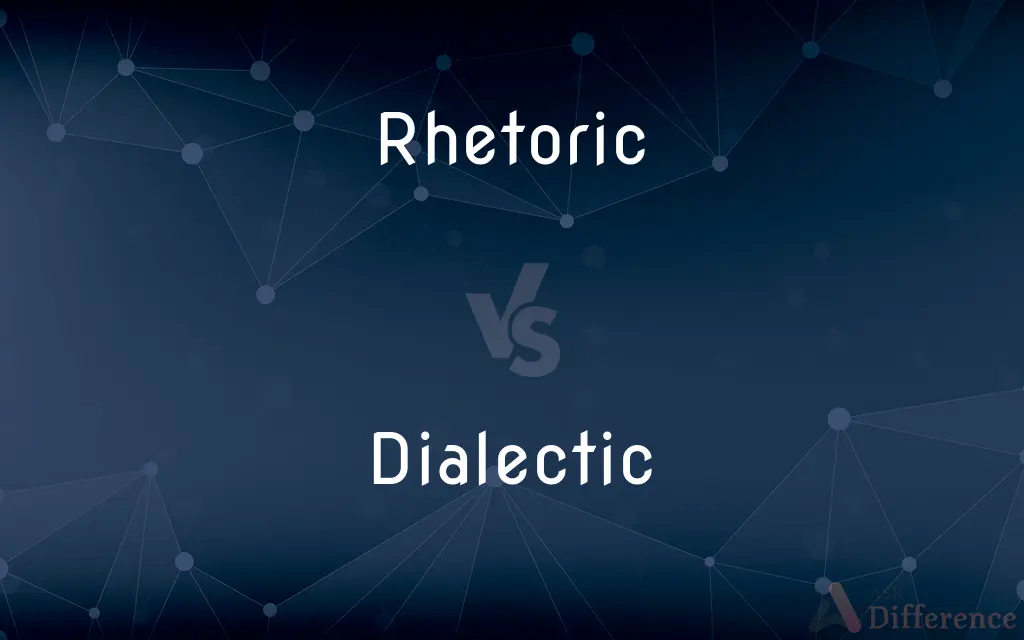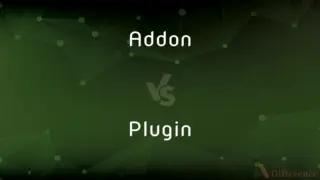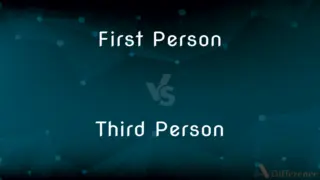Rhetoric vs. Dialectic — What's the Difference?
By Tayyaba Rehman — Updated on September 27, 2023
Rhetoric focuses on the art of persuasion through effective language use, often aiming for emotional impact. Dialectic is a method of reasoning through dialogue, aimed at arriving at a logical truth through argument and counter-argument.

Difference Between Rhetoric and Dialectic
Table of Contents
ADVERTISEMENT
Key Differences
Rhetoric is primarily concerned with the art of effective communication and persuasion. It employs a range of techniques to elicit emotions, beliefs, or actions from an audience. Dialectic, on the other hand, is a method of intellectual investigation through conversation, aimed at arriving at a reasoned conclusion by dissecting arguments and counter-arguments.
Rhetoric often uses elements like pathos, ethos, and logos to sway an audience. These elements appeal to emotions, ethics, and logic, respectively. Dialectic is less about emotional or ethical appeals and more about structured argumentation. It often employs the Socratic method, asking questions to dissect an argument critically.
In terms of grammatical use, both "rhetoric" and "dialectic" function as nouns. However, they can also be used as adjectives—rhetorical and dialectical—to describe processes or techniques that employ these methods. While rhetoric is often associated with speeches, essays, and propaganda, dialectic is more common in academic, philosophical, or scholarly discussions.
Rhetoric tends to be a monologue aimed at convincing or persuading an audience, often utilizing emotional or ethical appeals. Dialectic is usually a dialogue between two or more parties, aiming to dissect differing viewpoints to arrive at a shared truth or understanding.
Comparison Chart
Primary Focus
Persuasion
Logical reasoning
ADVERTISEMENT
Method
Monologue
Dialogue
Grammatical Role
Used as a noun and adjective
Used as a noun and adjective
Common Contexts
Speeches, essays, propaganda
Academic discussions, philosophy
Emotional Appeal
Often employs emotional appeals
Primarily focuses on logical reasoning
Compare with Definitions
Rhetoric
A style of speaking or writing.
The lawyer's rhetoric was particularly compelling.
Dialectic
A method of reasoning through dialogue.
The dialectic between the two philosophers was enlightening.
Rhetoric
The art of effective or persuasive communication.
The politician's rhetoric swayed the voters.
Dialectic
A dialogue between opposing viewpoints.
The dialectic in the debate led to a shared understanding.
Rhetoric
Skill in using language to persuade or influence.
The salesman's rhetoric convinced me to buy the product.
Dialectic
Systematic argumentation to arrive at truth.
Dialectic methods were employed in the research study.
Rhetoric
The art or study of using language effectively and persuasively.
Dialectic
The art or practice of arriving at the truth by the exchange of logical arguments.
Rhetoric
A treatise or book discussing this art.
Dialectic
The process especially associated with Hegel of arriving at the truth by stating a thesis, developing a contradictory antithesis, and combining and resolving them into a coherent synthesis.
Rhetoric
Skill in using language effectively and persuasively.
Dialectic
Often dialectics (used with a sing. or pl. verb) The Marxian process of change through the conflict of opposing forces, whereby a given contradiction is characterized by a primary and a secondary aspect, the secondary succumbing to the primary, which is then transformed into an aspect of a new contradiction.
Rhetoric
A style of speaking or writing, especially the language of a particular subject
Fiery political rhetoric.
Dialectic
Dialectics (used with a sing. verb) A method of argument or exposition that systematically weighs contradictory facts or ideas with a view to the resolution of their real or apparent contradictions.
Rhetoric
Language that is elaborate, pretentious, insincere, or intellectually vacuous
His offers of compromise were mere rhetoric.
Dialectic
The contradiction between two conflicting forces viewed as the determining factor in their continuing interaction.
Rhetoric
Verbal communication; discourse.
Dialectic
Any formal system of reasoning that arrives at a truth by the exchange of logical arguments.
Rhetoric
Synonym of rhetorical.
Dialectic
A contradiction of ideas that serves as the determining factor in their interaction.
This situation created the inner dialectic of American history.
Rhetoric
The art of using language, especially public speaking, as a means to persuade.
Dialectic
(Marxism) Progression of conflict, especially class conflict.
Rhetoric
Meaningless language with an exaggerated style intended to impress.
It’s only so much rhetoric.
Dialectic
Dialectical.
Rhetoric
The art of composition; especially, elegant composition in prose.
Dialectic
Dialectal.
Rhetoric
Oratory; the art of speaking with propriety, elegance, and force.
Dialectic
Same as Dialectics.
Plato placed his dialectic above all sciences.
Rhetoric
Hence, artificial eloquence; fine language or declamation without conviction or earnest feeling.
Dialectic
Pertaining to dialectics; logical; argumental.
Rhetoric
Fig. : The power of persuasion or attraction; that which allures or charms.
Sweet, silent rhetoric of persuading eyes.
Dialectic
Pertaining to a dialect or to dialects.
Rhetoric
Using language effectively to please or persuade
Dialectic
Any formal system of reasoning that arrives at the truth by the exchange of logical arguments
Rhetoric
High flown style; excessive use of verbal ornamentation
Dialectic
A contradiction of ideas that serves as the determining factor in their interaction;
This situation created the inner dialectic of American history
Rhetoric
Loud and confused and empty talk;
Mere rhetoric
Dialectic
Of or relating to or employing dialectic;
The dialectical method
Rhetoric
Study of the technique and rules for using language effectively (especially in public speaking)
Dialectic
Investigation of truths through argument and counter-argument.
Through dialectic, we arrived at a logical conclusion.
Rhetoric
Techniques to appeal to emotions, ethics, or logic.
His rhetoric utilized pathos to connect with the audience.
Dialectic
Philosophical technique of questioning to reach a conclusion.
The Socratic dialectic helped us dissect the argument.
Rhetoric
Ornamental language often without substance.
Despite the grand rhetoric, the speech lacked substance.
Common Curiosities
What does Dialectic mean?
Dialectic is a method of logical reasoning through dialogue, focusing on argument and counter-argument.
How is Rhetoric used?
Rhetoric is often used in speeches, essays, and advertising to persuade or influence.
What is the Socratic Method in Dialectic?
The Socratic Method is a form of dialectic that uses questioning to explore and dissect arguments.
Is Rhetoric always verbal?
No, rhetoric can also be visual or textual, as long as it aims to persuade.
Can Dialectic be emotional?
Dialectic primarily focuses on logical reasoning, though it doesn't completely negate emotional aspects.
How do you identify Rhetoric?
Rhetoric can often be identified by its persuasive elements and its aim to influence.
Is Dialectic only for academics?
While commonly used in academic or philosophical contexts, dialectic can be used in any reasoned discussion.
What does Rhetoric mean?
Rhetoric is the art of persuasive communication, often appealing to emotion, logic, or ethics.
Is Rhetoric manipulative?
Rhetoric can be used for both ethical and manipulative purposes, depending on the intent.
What are the elements of Rhetoric?
Elements of rhetoric include pathos (emotion), ethos (ethics), and logos (logic).
Is Rhetoric a form of art?
Rhetoric is often considered an art as it involves creative use of language to persuade.
Can Rhetoric and Dialectic coexist?
Yes, rhetoric can be used within a dialectic discussion, but they serve different primary purposes.
Can Dialectic resolve conflicts?
Dialectic can help resolve intellectual conflicts by reaching a reasoned conclusion.
Is Dialectic a science?
Dialectic is not strictly a science, but it employs systematic methods of reasoning.
How do you identify Dialectic?
Dialectic is identified by its structured argumentation and dialogue aimed at finding truth.
Share Your Discovery

Previous Comparison
Addon vs. Plugin
Next Comparison
First Person vs. Third PersonAuthor Spotlight
Written by
Tayyaba RehmanTayyaba Rehman is a distinguished writer, currently serving as a primary contributor to askdifference.com. As a researcher in semantics and etymology, Tayyaba's passion for the complexity of languages and their distinctions has found a perfect home on the platform. Tayyaba delves into the intricacies of language, distinguishing between commonly confused words and phrases, thereby providing clarity for readers worldwide.













































